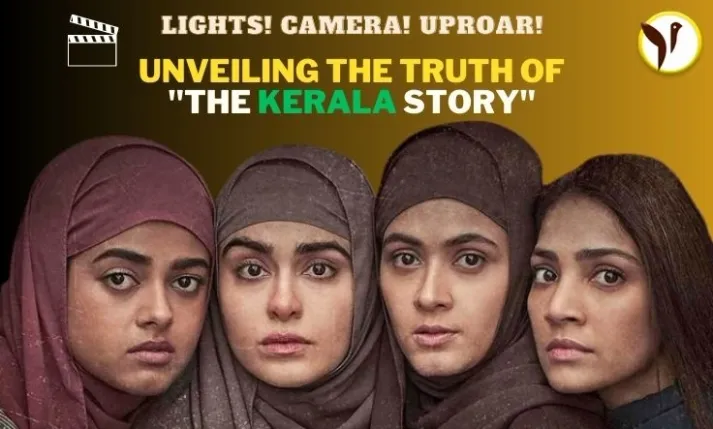The recent release of the Hindi-language drama film "The Kerala Story" has generated significant controversy and sparked heated debates across India. Directed by Sudipto Sen and produced by Vipul Amrutlal Shah, the film claims to be based on a real-life incident while centring on the conspiracy theory of "love jihad" in Kerala.
In terms of both incorrect content and box office revenue, propagandist films recently reached heights with the release of The Kashmir Files and The Kerala Story.
This article explores the storyline, the criticisms it faced, the Kerala Story's ongoing political reactions, and the factual accuracy of the film's claims.
Must Read India shows the green flag to Unban BGMI?
Storyline of the "Contentious Film: The Kerala Story”
"The Kerala Story" revolves around the character of Shalini Unnikrishnan, who converts to Islam and shares her distressing experience of aspiring to become a nurse, only to be abducted and coerced by extremist groups. The film suggests that thousands of women from Kerala are being converted to Islam and recruited into ISIS, based on the conspiracy theory of "love jihad."
Upon its release, "The Kerala Story" received an overwhelmingly negative critical reception, with many reviewers characterizing it as propaganda.
The Bharatiya Janata Party (BJP) promoted the movie during the Karnataka assembly election campaign, which they ultimately lost.
Several theatres refused to screen the film, and legal cases and protests followed, primarily in Kerala and Tamil Nadu. The Indian National Congress and the Communist Party of India accused the filmmakers of defaming Kerala and promoting the agenda of Hindu nationalist organizations.
The centre cause of Controversy: Political Reactions and Regional Variances
The movie has managed to bring in a staggering Rs 165 crore domestically. To date, Kerala Story has been the second-highest-grossing Hindi movie of 2023.
Following its release, "The Kerala Story" faced mixed reactions from political leaders across different states. West Bengal CM Mamata Banerjee declared a state-wide ban on the film. Kerala Chief Minister Pinarayi Vijayan also expressed strong disapproval, considering the film as propaganda by the Sangh Parivar, accusing them of attempting to disrupt religious harmony. Further, the film was also removed from Tamil Nadu screens two days after it opened in theatres.
He claimed that the Sangh Parivar used this "propaganda" movie, which highlighted alienating Muslims, to gain political benefit in Kerala. He further charged the Sangh Parivar with "sowing poisonous seeds of communalism" to undermine religious peace inside the state.
The Congress also disapproved of the movie, stating that one's freedom of speech did not grant them "permission to spew venom in the society."
Contrary to this, Madhya Pradesh CM Shivraj Chouhan praised it for exposing the truth of terrorism and declared it tax-free in the state. In addition, Uttar Pradesh Chief Minister Yogi Adityanath supported the film and made it tax-free.
Fact or Fiction: The Numbers and Authenticity
While the film claims that the base is a real-life incident, the statistics presented lack authentic evidence. The Supreme Court of India directed the film's producers to include a disclaimer indicating that- there is no hard evidence to support the assertion that 32,000 persons have converted to Islam. According to reports, only three women from Kerala converted to Islam, with two being Christians and one Hindu. In comparison, the number of individuals from other countries who have fallen into the trap of ISIS is significantly higher.
The known number of women falling into this trap is three in India, but the numbers in other countries are much more. It is 2500 from Russia, 1700 from France, 4200 (approximately) from the European Union, 760 from Germany, and a long list of other countries.
India's unique "Unity in Diversity" nature is cited as a possible reason for the relatively low number of individuals falling into extremist ideologies. India's syncretic culture and the practice of a softer and more liberal version of Islam have reportedly made Indian recruits less appealing to ISIS.
The controversy surrounding "The Kerala Story" has highlighted the power of cinema to shape public opinion and ignite political debates. The film's portrayal of "love jihad" and the conversion of women to Islam in Kerala has faced criticism for lacking factual evidence.
It is impossible to dispute the movie's box office success, but debate persists over its ramifications and impact. As the discussions continue, it is critical to distinguish fact from fiction and to encourage ethical storytelling that promotes social cohesion and understanding.
Also, Read Apple to Restrict Use of AI Tool ChatGPT for Employees







